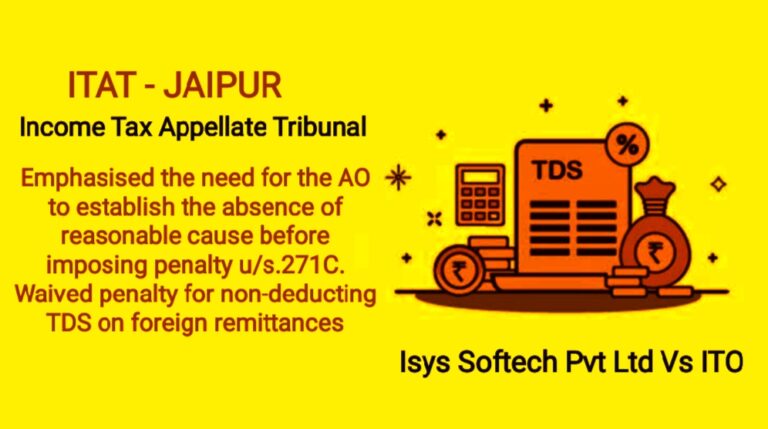ITAT emphasized the need for the assessing officer to establish the absence of reasonable cause before imposing penalty under section 271C of I-T Act
ITAT Jaipur waives Penalty Imposed for non-deduction of TDS on Foreign Remittances: In a recent judgement on 22.11.23 in case of Isys Softech Pvt Ltd Vs ITO Ward 2(2) Jaipur (ITA No.528/JP/2023), the Jaipur Income Tax Appellate Tribunal (ITAT) has ruled in favour of an assessee by eliminating the penalty imposed for the default of not deducting Tax Deducted at Source (TDS) on foreign remittances. This decision stems from an appeal against the penalty order under section 271C of the Income Tax Act, 1961, initiated by the Additional Commissioner of Income Tax (TDS), Jaipur.
Background of the Case:
The case involves an order dated 30.04.2014, where the assessing officer disallowed an amount of Rs. 1,14,68,382/- under section 40(a)(i) of the Income Tax Act, 1961. The disallowance was related to payments made by the assessee company for software licenses and set-up charges to two USA-based companies M/s BJW consulting Service LLC and Practice forces – Anesthesia Billing software. The assessing officer argued that Tax Deducted at Source (TDS) should have been deducted as per section 195(1) of the Act.
Subsequent to the disallowance, a penalty notice under section 271C was issued to the assessee on 22.03.2018. The penalty order, totalling Rs. 11,46,838/-, was passed by the Additional Commissioner of Income Tax (TDS) on the grounds of non-deduction of TDS.
Assessee’s Grounds of Appeal:
Disagreement with the assessing officer’s interpretation of the law and penalty imposition.
Assertion that there is a four-year limitation for initiating and levying penalties, which was overlooked by the Commissioner of Income Tax (Appeals).
Emphasis on the bona fide belief of the assessee that no tax is deductible, given the absence of a Permanent Establishment (PE) and other relevant factors.
Ruling of ITAT Jaipur:
The ITAT considered the facts of the case and noted that the disallowance made by the assessing officer was sustained in the first appeal. However, the ITAT partially allowed the second appeal, directing a 100% deduction under section 10A of the Act on enhanced profit.
Crucially, the ITAT emphasized the need for the assessing officer to establish the absence of reasonable cause before applying section 271C. The tribunal noted that the assessee, in this case, had a reasonable cause for not deducting TDS, as the effect was revenue-neutral after allowing the deduction under section 10A.
The ITAT cited the decision of the Hon’ble Apex Court in the case of CIT vs. Bank of Nova Scotia, highlighting that there was no deliberate inaction on the part of the assessee, and the penalty was not warranted.
Conclusion:
In light of the reasonable cause presented by the assessee and the revenue-neutral impact of the disallowance, the ITAT ruled in favour of the assessee, waiving the penalty imposed under section 271C. This decision provides clarity on the importance of establishing reasonable cause in TDS-related penalties and highlights the significance of the specific circumstances of each case.
To Read About Extension of Time Limit for Processing of ITRs of AY 2018-19 To AY 2020-21 CLICK HERE
READ MORE
Potential Income Tax Relief for Salaried Class Taxpayers in Upcoming Budget-2024
